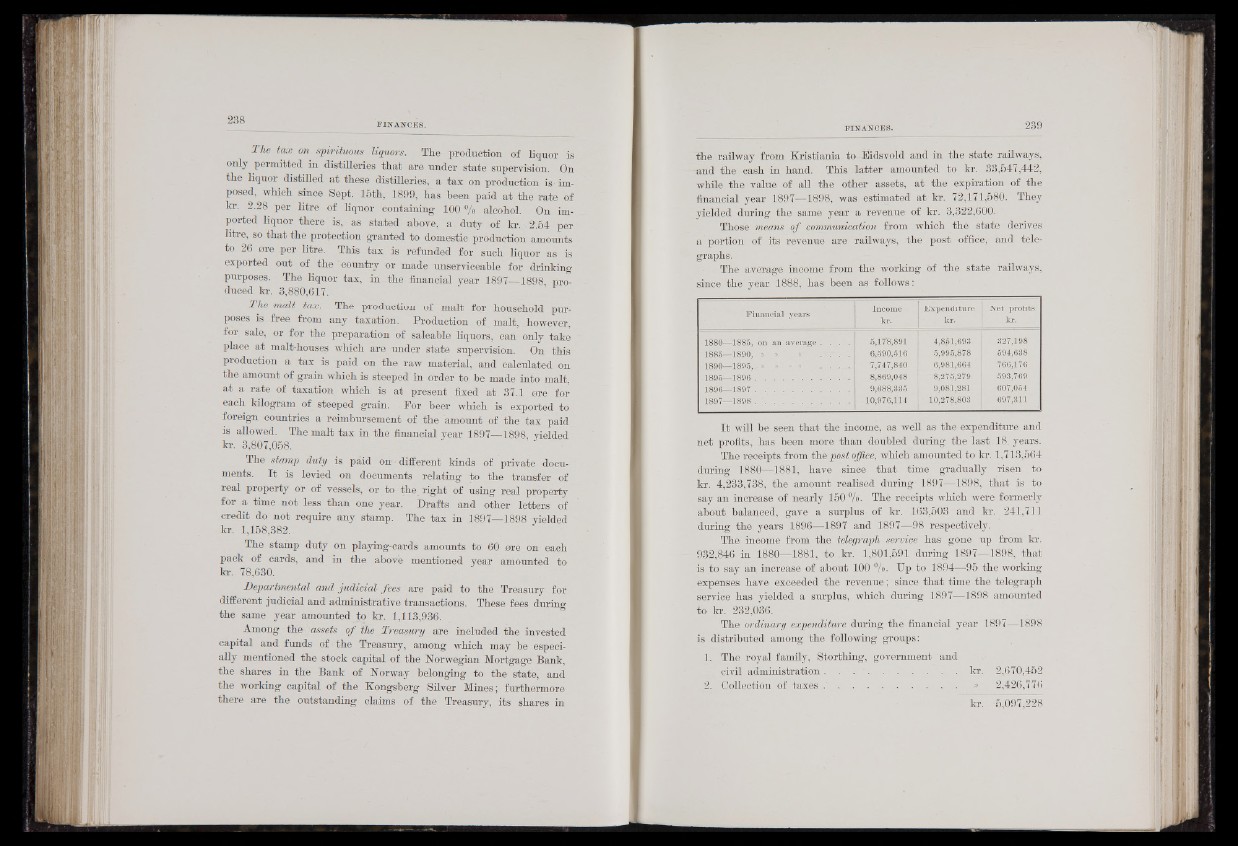
The tax on spirituous liquors. The production of liquor is
only permitted in distilleries that are under state supervision. On
the liquor distilled at these distilleries, a tax on production is imposed,
which since Sept. 15th, 1899, has been paid at the rate of
kr. 2.28 per litre of liquor containing 100 % alcohol. On imported
liquor there is, as stated above, a duty of kr. . 2,54 per
litre, so that the protection granted to domestic production amounts
to 26 ore per litre. This tax is refunded for such liquor as is
exported out of the country or made unserviceable for drinking
purposes. The liquor tax, in the financial year 1897—1898, produced
kr. 3,880,617.
The malt tax. The production of malt for household purposes
is free from any taxation. Production of malt, however,
for sale, or for the preparation of saleable liquors, can only take
place at malt-houses which are under state supervision. On this
production a tax is paid on the raw material, and calculated on
the amount of grain which is steeped in order to be made into malt,
at a rate of taxation which is at present fixed at 37.1 ore for
each kilogram of steeped grain. For beer which is exported to
foreign countries a reimbursement of the amount of the tax paid
is allowed. The malt tax in the financial year 1897-S&898, yielded
kr. 3,807,058!
The stamp duty is paid on- different kinds of private documents.
I t is levied on documents relating to the transfer of
real property or of vessels, or to the right of using real property
for a time not less than one year. Drafts and other letters of
credit do not require any stamp. The tax in 1897S1898 yielded
kr. 1,158,382..
The stamp duty on playing-cards amounts to 60 ore on each
pack of cards, and in the above mentioned year amounted to
kr. 78,630.
Departmental and judicial fees are paid to the Treasury for
different judicial and administrative transactions. These fees during
the same year amounted to kr. 1,113,936.
Among the assets of the Treasury are included the invested
capital and funds of the Treasury, among which may be especi-
ally mentioned the stock capital of the Norwegian Mortgage Bank,
the shares in the Bank of Norway belonging to the state, and
the working capital of the Kongsberg Silver Mines; furthermore
there are the outstanding claims of the Treasury, its shares in
the railway from Kristiania to Eidsvold and in the state railways,
and the cash in hand. This latter amounted to kr. 33,547,442,
while the value of all the other assets, at the expiration of the
financial year 1897—1898, was estimated at kr. 72,171,580. They
yielded during the same year a revenue of kr. 3,322,600.
Those means of communication from which the state derives
a portion of its revenue are railways, the post office, and telegraphs.
The average income from the working of the state railways,
since, the year 1888, has been as follows:
Financial years Income
kr.
Expenditure
kr.
Net profits
kr.
§|880-%iÉ885, on an average . . . .
1885—1890, » » » . .
1890—1896,-x- » » • » ... . .. I
1895-j§896 . ......................................
1896-1897 .........................................
1897-4ÜÈ898 .........................................
6,17*8,891
6,590,516
7,747,840
8,869,048
9,688,335
. 10,976,114
4,851,693
5,995,878
6,981,664
8,275,279
9,081,281
. 10,278,803
327,198
594,638
766,176
593,769
607,054
697,311
I t will be seen that the income, as well as the expenditure and
net profits, has been more than doubled during the last 18. years.
The receipts from the post office, which amounted to kr. 1,713,564
during 188'0—1881, have since that time gradually risen to
kr. 4,233,738, the amount realised during 1897- 1898, that is to
say an increase of nearly 150 °/o. Thé receipts which were formerly
about balanced, gave a surplus of kr. 163,503 and kr. 241,711
during the years 1896—1897 and 1897—98 respectively.
The income from the telegraph service has gone up from kr.
932,846 in 1880—1881, to .kr. 1,801,591 during 1897 :1898. that
is to say an increase of about 100 %. Up to 1894j—95 the working
expenses-have exceeded the revenue ; since that time the telegraph
service has yielded a surplus, which during 1897—1898 amounted
to kr. 232,036.
The ordinary expenditure during the financial year 1897—1898
is distributed among the following groups:
1. The royal family, Storthing, government and
civil administration..................................................kr. 2,670,452.
2. Collection of taxes . ' .................................... » 2,426,776
kr. 5,097,228